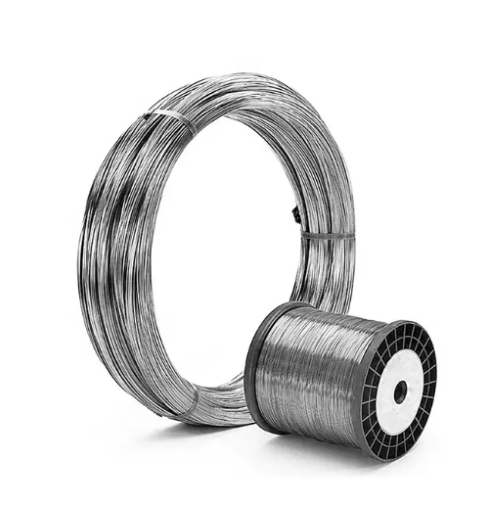
Titanium wire is a versatile and durable material widely used in industries such as aerospace, medical, chemical processing, and jewelry-making. Known for its strength, corrosion resistance, and lightweight properties, titanium wire is manufactured in various grades, sizes, and forms to suit specific applications.

Types of Titanium Wire
1. Pure Titanium Wire (Grades 1–4)
Pure titanium wire is classified into four grades based on its strength and oxygen content. These wires offer excellent corrosion resistance, biocompatibility, and weldability, making them suitable for a range of applications.
- Grade 1: Soft and ductile, this is the most corrosion-resistant pure titanium wire. It is used in chemical processing and marine environments.
- Grade 2: A balance of strength, ductility, and corrosion resistance makes this the most commonly used pure titanium wire. It is utilized in medical implants, heat exchangers, and piping systems.
- Grade 3: Stronger than Grades 1 and 2, but slightly less ductile. It is used in aerospace and industrial applications.
- Grade 4: The strongest of the pure titanium wires, Grade 4 is often used in aerospace, medical implants, and high-stress environments.
2. Titanium Alloy Wire (Grades 5, 7, 9, and 23)
Titanium alloy wire contains additional elements like aluminum, vanadium, palladium, or zirconium to enhance its strength, corrosion resistance, and other properties.
- Grade 5 (Ti-6Al-4V): The most widely used titanium alloy, known for its high strength-to-weight ratio and corrosion resistance. It is commonly used in aerospace, automotive, and medical applications, such as surgical tools and implants.
- Grade 7: Contains palladium, which provides superior corrosion resistance, especially in acidic environments. It is ideal for chemical processing and desalination plants.
- Grade 9 (Ti-3Al-2.5V): A lightweight, strong alloy used in aerospace applications, bicycle frames, and sporting goods.
- Grade 23 (Ti-6Al-4V ELI): An “extra-low interstitial” variant of Grade 5, offering enhanced biocompatibility. It is extensively used in medical implants like dental and orthopedic devices.
3. Titanium Wire Forms
- Straight Wire: Manufactured as long, rigid rods, it is typically used in welding, orthodontics, and precision engineering applications.
- Coiled Wire: Flexible and supplied in continuous spools, coiled titanium wire is ideal for springs, jewelry, and industrial use.
- Fine Wire: With a smaller diameter, fine titanium wire is used in intricate applications like electronics, medical sutures, and woven wire mesh.
- Welding Wire: Titanium welding wire is specifically designed for use as filler material in titanium welding processes.
Applications of Titanium Wire
Titanium wire is used across numerous industries due to its unique combination of properties:
- Aerospace:
- Lightweight yet strong titanium wire is used in aircraft frames, engine components, and fasteners.
- High-temperature resistance makes it suitable for turbine parts.
- Medical:
- Biocompatibility ensures its use in dental braces, surgical tools, and implants like bone plates and screws.
- Fine titanium wire is used in cardiovascular stents and sutures.
- Chemical Processing:
- Corrosion-resistant titanium wire is used in acid-resistant equipment, heat exchangers, and desalination systems.
- Jewelry:
- Lightweight and hypoallergenic, titanium wire is popular for crafting necklaces, earrings, and rings.
- Sports and Recreation:
- Titanium alloy wires are used in lightweight yet durable bicycle frames, golf clubs, and tennis rackets.
- Industrial:
- Wires are used in manufacturing springs, filters, and wire mesh for various industrial processes.
Conclusion
Titanium wire, available in pure and alloy grades, offers unmatched performance in demanding environments. Whether it’s Grade 1 for corrosion resistance in marine applications or Grade 5 for high strength in aerospace, each type of titanium wire is engineered for specific purposes. Additionally, its lightweight nature, biocompatibility, and exceptional durability make titanium wire a preferred choice for industries ranging from aerospace to jewelry-making. With its diverse forms and grades, titanium wire continues to enable advancements in technology and design. For more information, please check Advanced Refractory Metals (ARM).

